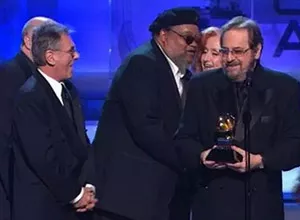Don Mizell '71 Donates 2005 Grammy Award to Swarthmore

For the first time in its history, Swarthmore College is the proud recipient of a Grammy Award. It comes to the College courtesy of Don Mizell '71, winner of the 2005 Grammy for Album of the Year. The annual Album of the Year Grammy is universally recognized as the most prestigious and distinguished award given in the music industry by the National Academy of Recording Arts and Sciences to artist(s) and producer(s) as voted by members of the Recording Academy. Mizell won the Grammy as a producer of the Ray Charles album "Genius Loves Company."
An anthropology major at Swarthmore, Mizell is convinced he would not have won the Grammy had it not been for the College. "My experiences at Swarthmore changed me deeply, more than any other experience I've had," Mizell says, "including my wanderjahr abroad as Swarthmore's first African American Thomas J. Watson Fellow and also at Harvard Law School."
Mizell says Swarthmore is where he began viewing all human creative endeavors through the lens of culture, thus he developed his appreciation for music as not just entertainment, but as the highest expression of culture. His idea to approach Ray Charles with the concept for "Genius Loves Company" was based on his conviction that Charles' contributions to American music culture in the 20th century were underappreciated.
"Ray Charles invented rhythm and blues, which is the father of rock and roll," says Mizell. "He changed the whole direction of jazz with the introduction of electronic instrumentation, ushering in the jazz fusion era, and he married country music to symphonic orchestral music, thus bringing it into the pop cultural mainstream. R&B, rock & roll, jazz fusion, and country pop - all are major tributaries in our musical culture. The album concept was to showcase and honor that."
As a student activist leader during his college years, Mizell, at the request of professors and administrators, worked closely with the College to recruit minority students and to develop programs to strengthen the overall African-American presence on campus. Among other contributions, he authored a much-lauded recruitment brochure, "Black at Swarthmore," which was used effectively by the Admissions Office throughout the 1970s. He also helped lead efforts to establish the Black Cultural Center (BCC) on campus so that black students at Swarthmore could have "a safe and nourishing harbor." Such a space opened in 1970, largely due to a major donation from James Michener '29.
Mizell, who now resides in South Florida after three successful decades in Los Angeles in the entertainment industry as an attorney and creative executive, returned to his alma mater in November of last year to be interviewed for a documentary film. When he visited the BCC, he was engaged by students who wanted to know more about his experience at Swarthmore and what the BCC signified to him.
"I was moved by how carefully the College and its Black community had maintained and nurtured the BCC since I was the first guy to walk through its doors more than four decades ago," says Mizell. He knew then that the Grammy, which owed its very existence to his life-changing experience at Swarthmore, should come back to Swarthmore and reside in its BCC. And it will, starting with a ceremony during the All-Alumni Reunion Weekend on the afternoon of Sat., June 7, in the BCC, preceded by a reception sponsored by the Swarthmore Black Alumni Network.
Maurice Eldridge '61, vice president for college and community relations, will introduce Mizell. Says Eldridge, "I am thrilled for the College and for Don that in this sesquicentennial year Don's Grammy is given to the College as an affirmation of its will to always be a better place and its ability to consciously act on that determination. Don's gift is a generous act of witness."



